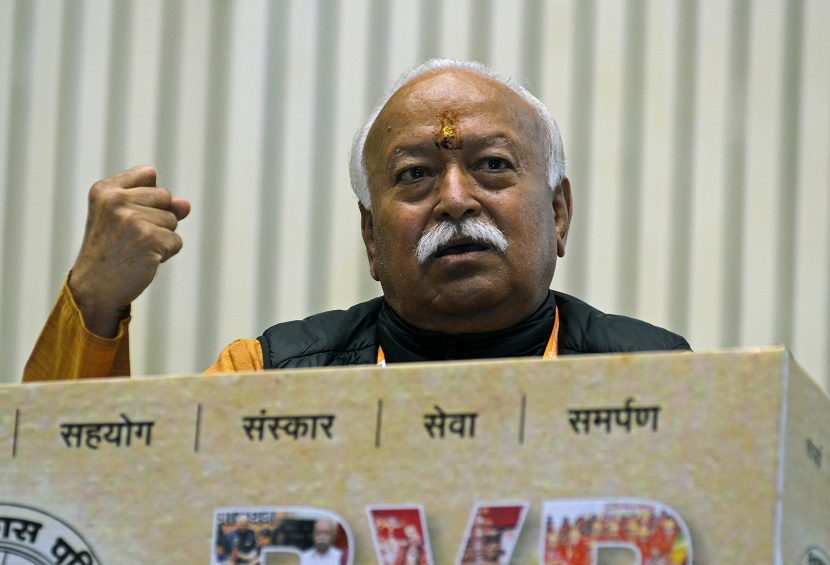Does he really believe that Pakistan will ever agree to Partition being undone?
Broadly speaking, I read the speeches and statements of Rashtriya Swayamsevak Sangh’s chief with care and undiminishing interest. That he is a heavyweight, cannot be denied.
I do not subscribe to his philosophy or that of the RSS. Neither do I wholly agree with what A.C. Noorani has written in his book, The RSS: A Menace to India, published in 2019 by Leftword.
Regrettably, to my disappointment, Shri Mohan Bhagwat on last Thursday made an astounding observation at the launch of Krishnanand Sagar’s book, Vibhajankaleen Bharat Ke Shakshi (The Witnesses of Partition Era India).
According to the report filed by Image ANI, Shri Bhagwat maintained that Partition was accepted only to avoid bloodshed. He apparently asserted that neither India nor Pakistan was happy as a consequence. Maintaining that was a matter of existence, he is supposed to have said, “We have to integrate what has been disintegrated”. He, according to the report, declared, “The proposal (for Pakistan) was accepted so that rivers of blood should not flow. If they did not do so, then a lot more blood would have blown back then and is even flowing back today. One thing is clear Partition cannot be a solution. Neither India is happy, nor are the people who demanded partition in the name of Islam are happy. Because we cannot derive happiness from this.”
“We have got Independence to give the World something. But we will be worth giving something to the World when we reverse this bad chapter in history and follow the path of our ‘Param Vaibhav’.”
I do not know what to make of this statement. It cannot be ruled out that Shri Mohan Bhagwat has been misquoted. But the Indian Express of 26 November confirms what I have quoted from ANI.
I quote from the Express News Service. “The only solution to the pain of Partition lies in undoing it, RSS chief Mohan Bhagwat said on Thursday.”
The Express quotes Shri Bhagwat: “If we want to become a strong nation and contribute in the World’s welfare, the Hindu Society will have to become capable. Bharat ke vibhajan ki peed ka samadhan, vibhajan ko nirast karne mein hai. (The solution to the pain of partition is in undoing it.)”
If what is reported is correct than Shri Bhagwat has to answer several questions. What is the methodology he has in mind to Nirast (undo) Partition? Does he really believe that Pakistan will ever agree to Partition being undone? That would mean the re-establishment of a pre-1947 India. Having been ambassador to Pakistan, I know how the Pakistan ruling class and the armed forces think. India is enemy number one. We defeated Pakistan in 1971. We helped the birth of an independent country, Bangladesh. It would be unrealistic to imagine that Bangladesh will ever wish to become a part of India.
President Zia-ul-Haq once told me, “We will never forget what India did to us in 1971.”
There can never be a meaningful and cordial relationship between the two countries. No one denies that Partition was unavoidable. Mr M.A. Jinnah, the supreme and undisputed leader of the Muslim League made it clear that Partition was the only solution to Hindu-Muslim differences.
In October 1962, Rajaji was staying in my apartment in New York. I asked him how the Congress could agree to Partition. He said (not his exact words) that finally even Gandhiji agreed when he saw that Jawaharlal, Sardar, myself, Pant and other members of the Congress Working Committee accepted the 3 June 1947 proposal for partitioning India.
Gandhiji attended the crucial meeting of the CWC, which was to approve the partition plan presented by Lord Mountbatten. There is no clear approval in the AICC. In the words of V.P. Menon, Gandhiji “clinched the issue by supporting the resolution moved by Pt. Pant, asking for accepting the 3rd June Plan”.
Gandhiji said that his views on the plan were well known the acceptance of the plan did not only involve the Congress Working Committee. There were two other parties to it, the British government and the Muslim League. If at this stage the All India Congress Committee rejected the Working Committee’s decision, what would the world think of it? The consequences of rejection would be the finding of a new set of leaders, who would not only be capable of constituting the Congress Working Committee but of taking charge of the government. They should not forget that peace in the country was very essential at this juncture. The Congress was opposed to Pakistan and he was one of those who had steadfastly opposed the division of India. Yet he had come before the All India Congress Committee to urge the acceptance of the resolution on India’s division. Sometimes certain decisions, however unpalatable they might be, had to be taken. The resolution was carried by 157 votes to 29. Thirty two members remained neutral.
Shri Bhagwat is being impractical. Respectfully, I ask him to abandon his idea of undoing Partition. It will never, never happen.

